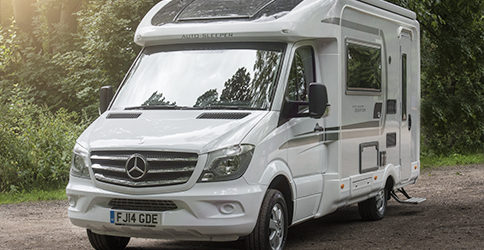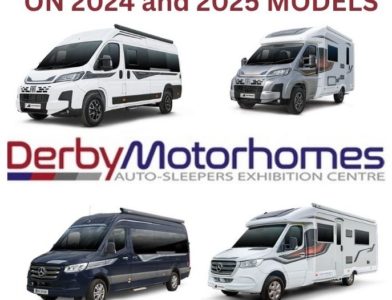Some things in life are destined to remain forever a dream unless you somehow find the ways and means of buying them – it’s not that money can buy you happiness, of course, but it certainly helps in making your dreams come true.
You don’t have to bank on the unpredictable British weather and expect a Summer that is dry, warm, and sunny. If you buy a motorhome, you’ll always have somewhere dry and cosy to see out the worst our climate may bring – or drive it over to the Continent, save on rising hotel costs, and have your own home away from home wherever you are.
What better way to enjoy the outdoor life and freedom of the open than behind the wheel of a motorhome? So, if you are thinking about buying a motorhome, what are some of the most important points to take into consideration?
Should I buy a new or used UK motorhome?
There’s nothing quite like knowing that you’re the first person to have taken your motorhome on its first outing, nothing like being the first person to have slept in it – so buying a new motorhome lets you in on all of that, together with the reassurance of a lengthy warranty.
The greatest obstacle, of course, is likely to be the cost of buying a new motorhome. Used motorhomes hold their value pretty well, but they do still depreciate, so one that is, say, three years old might offer a significant saving on the new price, if it still has a relatively low mileage.
Whether to buy a new or second-hand UK motorhome depends on several factors, including your budget, preferences, and priorities. Both options have their advantages and disadvantages, so consider the following points to help you make an informed decision:
What are the pros and cons of buying a brand new UK motorhome?
Buying a brand new UK motorhome comes with its own set of advantages and disadvantages. Here are the pros and cons to consider:
Pros of buying a new motorhome
- Reliability: New motorhomes are less likely to have mechanical issues or require repairs because they are covered by warranties. This means you can have confidence in the vehicle’s reliability for your travels;
- Warranty cover: New motorhomes typically come with warranties that cover various components for a specified period. This can save you money on repairs and maintenance during the warranty period;
- Latest features: You’ll have access to the latest technology, safety features, and design innovations. This can enhance your comfort, convenience, and overall travel experience;
- Customisation: When buying new, you often have the option to customize your motorhome to your liking. You can choose the layout, interior finishes, and additional accessories to suit your preferences and needs;
- Fuel efficiency: Newer motorhomes may be more fuel-efficient due to advances in engine technology, which can save you money on fuel costs in the long run;
- Resale value: While new motorhomes do depreciate, they tend to retain their value better than used ones over the first few years. If you decide to sell or trade in your motorhome down the line, you may get a higher resale value.
Cons of buying a new motorhome
- Higher initial cost: New motorhomes come with a premium price tag, which can be significantly higher than that of used models with similar features. This can strain your budget;
- Depreciation: While new motorhomes retain their value better than used ones initially, they still depreciate quickly in the first few years. You’ll experience a substantial loss in value if you decide to sell or trade in the motorhome within that time frame;
- Limited availability: New motorhomes may have limited availability, especially if you’re looking for a specific make and model. You may need to wait for the manufacturer to produce and deliver your chosen configuration;
- Higher insurance costs: Insuring a new motorhome can be more expensive than insuring a used one due to the higher replacement cost in case of accidents or theft;
- First-year bugs: Even with warranties, new motorhomes can sometimes have unexpected issues or bugs that need to be addressed during the first year of ownership;
- Customisation costs: While customisation is a pro, it can also add to the overall cost of your new motorhome. Upgrading or adding features can increase the price significantly.
What are the pros and cons of buying a second hand UK motorhome?
Buying a second-hand UK motorhome, also known as a used motorhome, comes with its own set of advantages and disadvantages. Here are the pros and cons to consider:
Pros of buying a second-hand motorhome
- Cost savings: Used motorhomes are generally more affordable than new ones, allowing you to get more value for your money. You can often purchase a higher-quality or larger motorhome within your budget;
- Less depreciation: New motorhomes depreciate rapidly in the first few years. When you buy used, you avoid the steepest part of this depreciation curve, which can save you a significant amount of money over time;
- History and condition: You can assess the history and condition of a used motorhome more easily. If the vehicle has been well-maintained and comes with a complete service history, you can have confidence in its reliability;
- Variety: The used market offers a wider range of motorhome models, brands, and layouts, giving you more options to find a configuration that suits your needs and preferences;
- Lower insurance costs: Insurance premiums for used motorhomes are often lower than those for new ones. This can result in cost savings over the life of your ownership;
- Less financial risk: Buying a used motorhome can be less financially risky, especially if you’re unsure about how much you’ll use it or if motorhome ownership is right for you. You can enter the market at a lower cost.
Cons of buying a second-hand motorhome
- If you are buying privately, there may be uncertainty about its condition: While you can assess the condition of a used motorhome, there may still be hidden issues or wear and tear that are not immediately apparent. A thorough inspection is essential;
- Potentially outdated features: Older used motorhomes may not have the latest technology, safety features, or design innovations that newer models offer;
- Limited Warranty (if you are buying privately): Used motorhomes may not come with the same warranty coverage as new ones, which means you may be responsible for repair costs shortly after purchase;
- Availability: Finding a specific used motorhome model or layout that suits your preferences may require more time and effort, as availability can be limited;
- Higher maintenance costs: As a motorhome ages, it may require more frequent maintenance and repairs. Be prepared for ongoing maintenance costs, especially with older models;
- Unknown history: Not all used motorhomes come with complete service histories, and some may have had multiple owners. This can make it challenging to assess how well the vehicle has been cared for if you are buying your used motorhome privately rather than from a dealer.
Ultimately, the choice between buying a new or used UK motorhome depends on your financial situation, preferences, and priorities. If you have a specific model in mind, want the latest features, and can afford it, a new motorhome may be the way to go. On the other hand, if you’re budget-conscious, open to a wider range of options, and willing to do some research on used models, a second-hand motorhome might be the better choice.
To help you decide whether to splash out on a new motorhome or get a good deal on a pre-loved vehicle, here at Derby Motorhomes we have a permanent exhibition of both new and used models from which to choose – after you’ve had your own up close and personal inspection of as many motorhomes you’d like to try out for size.
Size matters
Probably the greatest feature of any motorhome is its versatility. You not only get to drive it from A to B, but it also provides shelter in which to take your lunch along the way and your accommodation when it is time for bed.
Versatility also gives you the choice between a motorhome that is a genuine home away from home – with all the creature comforts you might possibly want – and a vehicle that is agile and manoeuvrable enough for negotiating new and unfamiliar routes while still providing more than adequate sleeping accommodation at the end of the day’s touring.
Size, therefore, often represents a balance between manoeuvrability on the move and spacious comfort at the end of the day. Summing up the questions of size, therefore:
- it is likely to come down to how you are planning to use your motorhome;
- is your motorhome likely to be used mainly just by you and your partner or do you need the extra berths for a child or two;
- are your outings and holidays planned mainly in the UK, or will you be taking your motorhome further afield in continental Europe;
- the balance between practical manoeuvrability, weighed against all the space and comfort a larger motorhome may offer, is likely to swing your judgment;
- however you choose, do keep a note in the cab of the height and width (metric and imperial) of your vehicle, if you encounter any road width or bridge height restrictions.
Whatever size motorhome you eventually choose, you might want to take advantage of one of the Manoeuvring Courses run by the Caravan and Motorhome Club.
Weight
Closely related to the question of how you plan to use your motorhome – and, in turn, its size – is the critical matter of its weight. The bigger your motorhome, of course, the heavier it is likely to weigh and the payload you can carry.
As a guide published by AutoTrader Motorhomes explains, weight is an equally important consideration, especially if you have chosen a vehicle in one of the heavier categories. You may then need to consider whether your standard Category B driving licence qualifies you to drive the vehicle.
The Camping and Caravanning Club explains that you currently need a Category C1 driving licence to drive a larger motorhome with an Maximum Authorised Mass (MAM, the technical term for the maximum laden weight of your caravan) between 3,500kg and 7,500kg.
If you passed your driving test before the 1st of January 1997, you are automatically entitled to this Category C1 licence, but if you took it after that date, you must take a separate driving test to gain the additional entitlement.
In either case, your current driving licence entitles you to drive motorhomes up to 3,500kg MAM – and the majority of motorhomes built in this country therefore comply with this weight restriction.
For the most up to date information, visit the Government website.
Layout
The design and planning that goes into the internal layout of every kind of motorhome – from a simple campervan to the largest of leisure vehicles – has become ever more skilled and innovative.
There are countless possibilities when it comes to the motorhome’s layout and you might want to give serious consideration to the one that best suits your proposed use.
If you are likely to be travelling alone or with your partner, for example, a simple layout that requires converting the seating into beds at night might suffice; if you are likely to be holidaying with the family or expect to be entertaining, then a layout that includes a more spacious lounge area and fixed beds may be more appropriate.
Budget
When you have made those necessary choices about the layout, overall size and weight of your preferred motorhome, the final decision might come down to the budget you have available or the motorhome finance that is available:
Your savings
- some people are fortunate to have savings – and, especially as you approach retirement, you might be looking forward to ways of spending your pension’s lump sum cash pay-out;
- by using your savings, of course, you avoid the need for finance altogether, so there are no credit repayments to find, no interest to pay, and your motorhome is 100% yours from the start;
- unfortunately, though, many people’s savings do not extend to the amount necessary to invest in the motorhome of their choice;
Personal loans
- even for such a relatively expensive purchase, your bank manager might still be amenable to granting an unsecured personal loan, which you repay in monthly instalments over a period of up to five or six years;
- as it is an unsecured loan, however, with the lender having nothing to fall back on if you default on the repayments, you are likely to need a more or less perfect credit score to secure this type of borrowing;
Dealer arranged finance
- if you are buying your new or used motorhome from a large and reputable, specialist dealer, however, you might need to look no further than the dealership itself;
- making the finance available goes hand in hand with any dealer’s main business of selling you the motorhome you have chosen and his standing and reputation in the market is likely to mean that any finance partners are competitive, reliable and duly regulated and authorised by the Financial Conduct Authority (FCA);
- try out our motorhome finance calculator to get an idea of costs;
Hire purchase
- one method of motorhome financing almost certain to be offered by such a dealer takes the familiar shape of a hire purchase agreement;
- this needs an initial deposit, typically around 10% of the purchase price, although you might be able to meet this requirement by trading in an older motorhome in part exchange for the one you want to buy;
- repayments are by equal monthly instalments, and if you default on these, you risk the motorhome being repossessed by the hire purchase company;
- that is because ownership of the motorhome is not transferred to you until the final instalment has been paid and it is illegal to attempt to sell your motorhome before that date whilst the outstanding finance balance remains;
- because hire purchase agreements are effectively secured against the vehicle in question, financial confidence is generally sufficient for a competitive rate of interest to be offered;
If you have ever dreamed of owning a motorhome, there are a number of financing options available to you – and many dealers may be able to help you turn your dreams into reality. Those options tend to be increasing all of the time. One of the most recent developments, for example, is the extension of Personal Contact Purchase deals to financing the purchase of your motorhome.
For a discussion about any of these motorhome finance options simply contact us here at Derby Motorhomes. You can also read our Motorhome finance guide here for more information.




